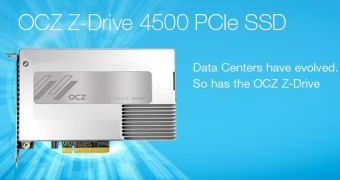Solid state drives are considered capacious if they have just 500 GB, although even drives of 120 GB are expensive and considered spacious, with NAND having such a small storage potential compared to magnetic platters of HDDs. And that's why the latest SSDs from OCZs will make jaws drop.
Well, maybe not. They are PCI Express drives after all, so they are expected to have more storage room and better speeds than even the best SATA III models.
Nevertheless, the storage and performance parameters of the enterprise-class Z-Drive 4500 PCI Express (PCIe) SSD Series are above what most would consider high-end.
After all, it's not every day that an SSD of 3.2 TB shows up, especially not one that can attain a sustained data transfer speed of 2,200 MB/s.
Speaking of which, the random 4K block read throughput is of up to 252,000 input/output operations per second (IOPS), while random 4K block write throughput is of up to 76,000 IOPS.
The type of NAND memory used to create the newcomer is one of the reasons for these specifications: Toshiba's 19nm NAND is one of the most advanced flash memories ever.
OCZ also included its new Windows Accelerator (WXL) Software, a software flash management and caching solution for Microsoft Windows Server applications.
It can be used by IT managers to deploy low-latency flash as local cache volumes for HDDs, or to combine them with normal flash volumes.
When the SSD is installed in the PCI Express slot to be used as cache drive, the WXL Software performs a statistical “out-of-band” operation to cache the most frequently accessed data on it.
There's also a cache warm-up and analysis mechanism featured in the program, which loads important and demanding analytical jobs on the Z-Drive 4500's flash cache ahead of the actual operation. It speeds up and smoothes out the process significantly.
But back to the drives themselves, the Z-Drive 4500 PCI Express (PCIe) SSD Series come in 800 GB and 1.6 TB options as well, all made from MLC NAND chips (multi-level cell).
They are all built according to OCZ's proprietary Virtualized Controller Architecture (VCA) and LSI SandForce SF-2582 processors.
Finally, they have 128-bit AES encryption, TRIM command support, new Linux and Windows kernel device drivers, and temperature sensing and thermal throttling (maintains consistent operating conditions so that the SSDs can work fine even when temperature varies abruptly). Sadly, as is often the case with enterprise products, no prices are known.

 14 DAY TRIAL //
14 DAY TRIAL //